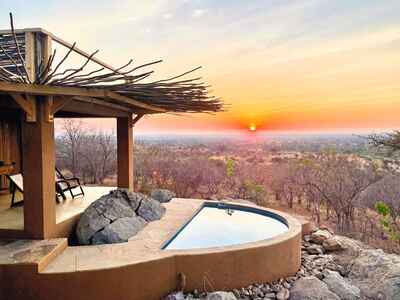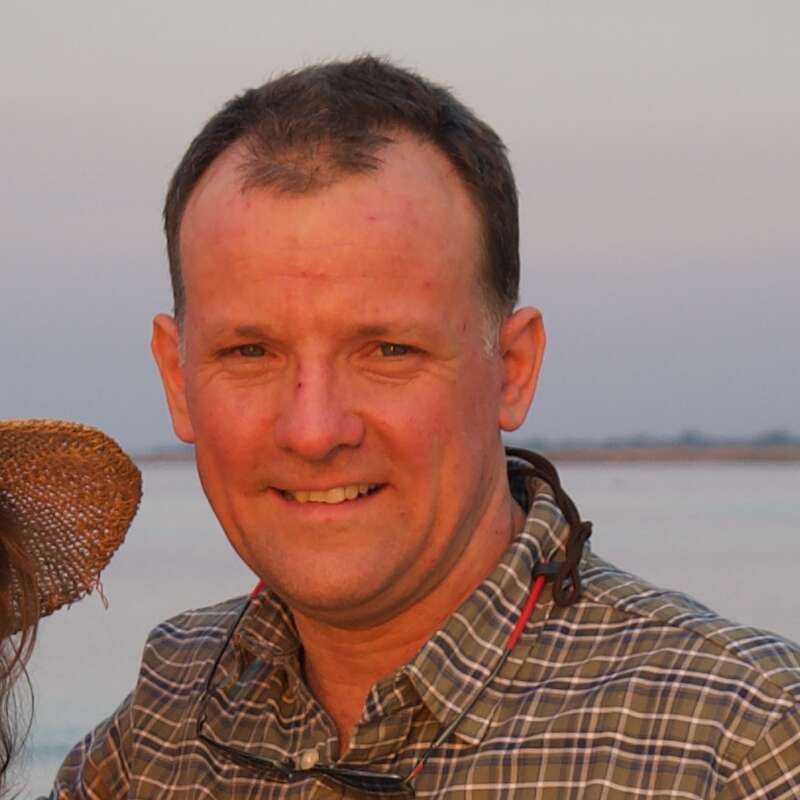About Kichaka Zumbua
Kichaka is one of Tanzania's top walking camps, and we were very excited to see the opening of Kichaka Zumbua ...
... in the remote north of Ruaha National Park, located close to the original tented camp. The owners Andrew "Moli" Molinaro and Noelle Herzog have wanted to establish a permanent camp in Ruaha for some years. Opened in late 2021, Kichaka Zumbua provides a luxurious base for exploring the wilds of Ruaha, with stylish suites, private plunge pools, and rooftop terraces.
Kichaka is one Tanzania’s most remote and exciting properties. We loved the original Kichaka camp, and equally impressed with the new, luxury Kichaka Zumbua. This is an ideal option if you're looking for top-quality guiding and walking in a remote area, combined with beautiful accommodation and creature comforts.
Our view
Kichaka is one Tanzania’s most remote and exciting properties. We loved the original Kichaka camp, and equally impressed with the new, luxury Kichaka Zumbua. This is an ideal option if you're looking for top-quality guiding and walking in a remote area, combined with beautiful accommodation and creature comforts.
Accommodation
3 Suites
Children
Best for 16+
Open
All year
Activities

4WD Safari

Birdwatching

Fly-camping

Guided walking safari

Private activities
Traveller reviews of Kichaka Zumbua
34 real, un-edited reviews from Expert Africa's travellers.
Arrived 9 Feb 2025, 3 nights
"Kichaka Zumbua review"
Overall rating: Excellent
Arrived 13 Jan 2025, 4 nights
"Kichaka Zumbua review"
Overall rating: Excellent
Arrived 1 Nov 2024, 5 nights
"Kichaka Zumbua review"
Overall rating: Excellent
Arrived 24 Sep 2024, 3 nights
"Kichaka Zumbua review"
Overall rating: Excellent
Arrived 26 Jun 2024, 3 nights
"Kichaka Zumbua review"
Overall rating: Excellent
Arrived 16 May 2024, 4 nights
"Kichaka Expeditions review"
Overall rating: Excellent
Arrived 18 Jan 2024, 4 nights
"My place in heaven"
Overall rating: Excellent
Arrived 16 Jan 2023, 4 nights
"Kichaka Zumbua review"
Overall rating: Excellent
Arrived 16 Oct 2022, 3 nights
"Kichaka Expeditions review"
Overall rating: Excellent
Arrived 14 Sep 2022, 5 nights
"Third visit to Kichaka"
Overall rating: Excellent
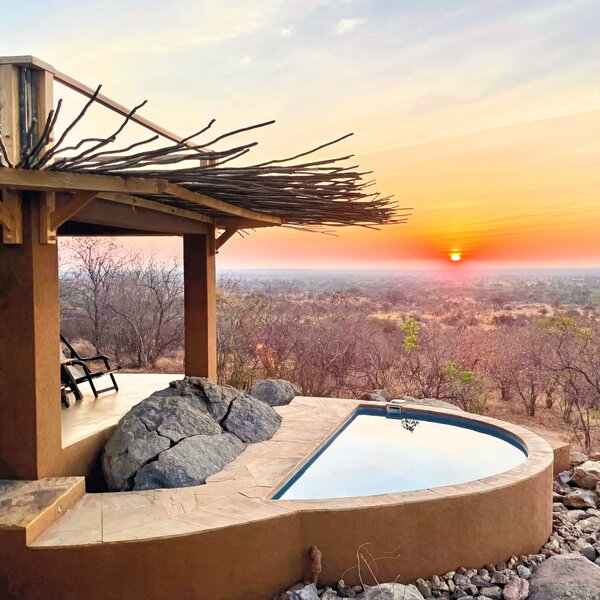
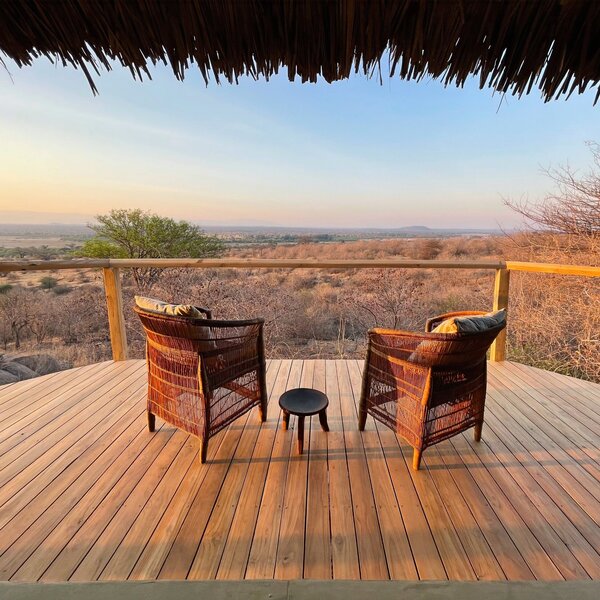
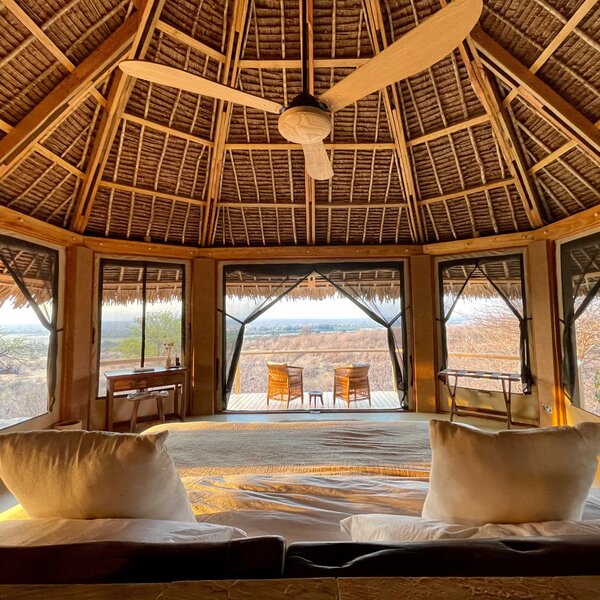
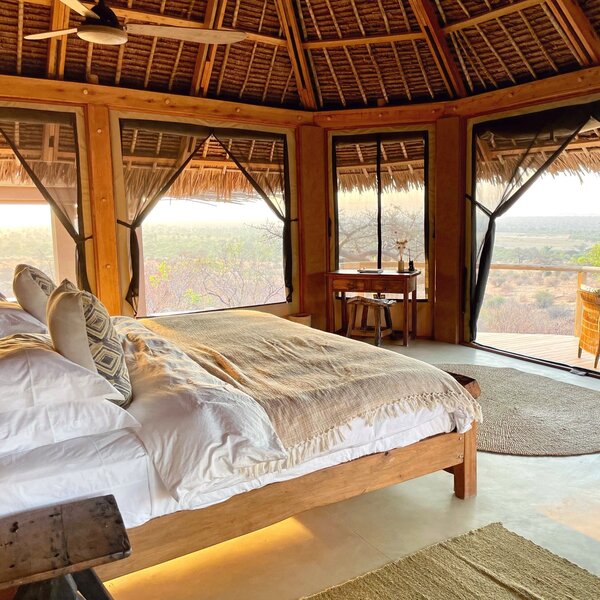
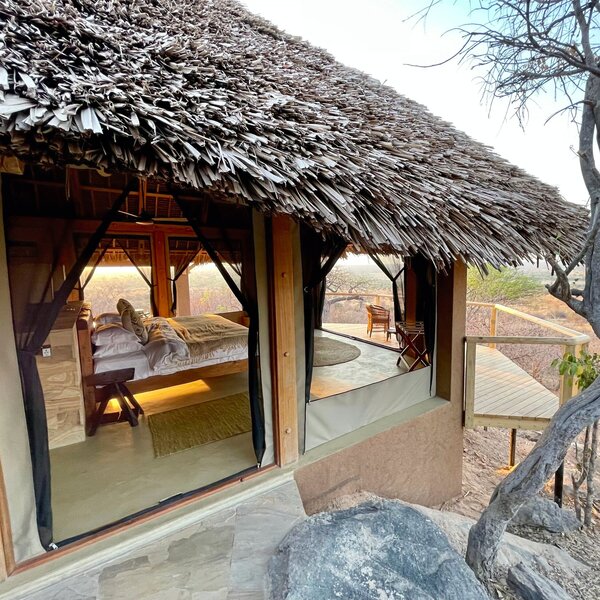

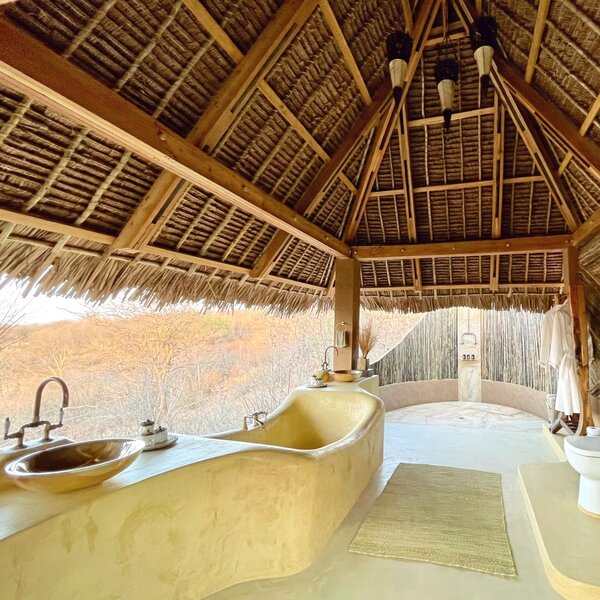
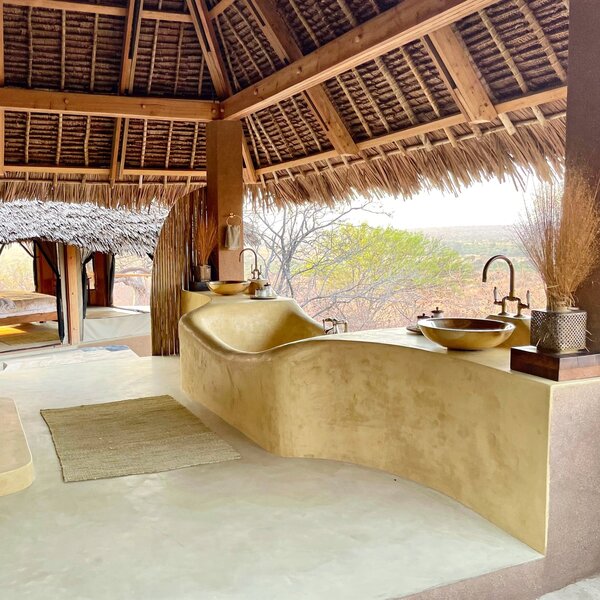
Expert Africa's gallery
When we travel we take lots of photos ourselves to give you a real and un-edited view of the safaris. See our 15 pictures of Kichaka Zumbua to get the candid view.
View galleryKichaka Zumbua: Our full report
Kichaka is one of Tanzania's top walking camps, and we were very excited to see the opening of Kichaka Zumbua ...
... in the remote north of Ruaha National Park, located close to the original tented camp. The owners Andrew "Moli" Molinaro and Noelle Herzog have wanted to establish a permanent camp in Ruaha for some years. Opened in late 2021, Kichaka Zumbua provides a luxurious base for exploring the wilds of Ruaha, with stylish suites, private plunge pools, and rooftop terraces.
Kichaka Zumbua is located vin an area the owners describe as being their favourite walking area. There are no other camps in this region and you are likely to see few other vehicles. There is a real sense of space and wilderness here.
By way of background, Moli and his partner Noelle had previously spent more than 6 years working at Jongomero Camp. There Moli gained a reputation for leading first-class walking safaris and also fell in love with Ruaha. He still spends what little free time he has training up the TANAPA rangers, who help to protect the park.
Moli and Noelle loved walking and wanted to explore the vast wilderness of Ruaha, much of which is still unmapped. A private mobile camp was the obvious answer for flexibility and quality of operation, so in 2013 Kichaka Expeditions was born. In 2021 this was a evolved into a more luxurious, permenant camp, Kichaka Zumbua.
Kichaka Zumbua currently consists of three luxurious suites, and there are plans to build additional suites in the future. A spacious bedroom area with a wooden balcony to the front is connected by a short pathway to a thatch-roofed bathroom, with an open-air shower and a beautiful bathtub with views across Ruaha. On the other side of the tent a separate structure provides a seating area with a private plunge pool, while a set of steps leads up to a rooftop terrace – perfect for evening sundowners. The suites have been designed with plenty of natural materials to compliment their environment.
There's a communal lounge and dining area and, based on our knowledge of Kichaka, we are confident the food will be excellent. One of our favourite aspects of Kichaka is the friendly, personal feel. The owners Moli and Noelle spend lengthy periods living at the camp and typically host communal meals which are very sociable and enjoyable.
The main reason for visiting Kichaka are the activities, and specifically the excellent guided walking safaris through untouched areas on the east side of Ruaha National Park. The guides will share their encyclopedic knowledge of Ruaha's flora and fauna with guests, and, if asked, will also include lessons on bushcraft skills, tracking, fire-lighting and the basics of bush survival. On our last visit here, we got close to several big game species during the walks with Moli: we tracked and found a male leopard, and shadowed a large heard of elephant for nearly an hour – all on foot. Activities are often conducted by Moli, and accompanied by a TANAPA ranger. The guides are always properly armed.
There is a healthy population of elephants in Ruaha and during a walking safari you may have the chance to approach them on foot. During a previous visit to Kichaka we shadowed a herd of elephants for more than an hour, with our guide's expertise and caution keeping us enthralled but always safe.
The other activity at the original Kichaka is fly-camping, and this is offered to guests staying at Kichaka Zumbua. You can do fly-camping between the 1st April and 30th November, the usual dry season in Ruaha. You might combine a few nights at Kichaka Zumbua with a few nights at the much simpler fly-camp, allowing you to explore the wildest corners of Ruaha. These tents are fairly basic, in order to be transported between areas, although they're still quite big – each is an unusually tall dome tent, about 4 metres x 4 metres and too high to reach with upstretched fingers. When they are being used, the camp staff move this fly-camp to a new location, so that guests are able to stay close to the game and explore untouched areas of the park. This is an adventurous experience and can be a great option if you're looking for a longer stay.
Geographics
- Location
- Ruaha National Park, Tanzania
- Ideal length of stay
- We would recommend a stay of at least three nights – and preferably four or five if you’d like to do some fly-camping.
- Directions
- It's a two-and-a-half hour flight from Dar to Ruaha's main Mtemere airstrip, and then a leisurely three-hour game drive to camp, often with lunch eaten by the river en route.
- Accessible by
- Fly-and-Transfer
Food & drink
- Usual board basis
- Full Board & Activities
- Food quality
- There is a maximum of 6 guests in camp at any one time, and so a huge amount of care is put into each individual meal. The quality and variety of the food at Kichaka is extremely good.
Breakfast will usually be served before the morning walk, and this will consist of a selection of fruit, cereals and toast followed by a full English for those who want it. This will usually be served in the main tent at camp.
Lunch tends to be quite light, consisting of a variety of salads, and some meat or fish cooked on the BBQ or on one of their gas stoves. It can be served anywhere in the bush and the staff will often set up a nice spot for lunch while the guests are walking. After lunch you will have the option to be driven back to camp or continue walking. During past visits we enjoyed sesame seed fried Nile perch, pork chops and beef fajitas. Dessert is normally light and fruit based.
Dinner is usually three courses and is often served out under the stars. The starter could be anything from beach prawns with garlic and parsley to aubergine, beef and pesto stacks (both were excellent!). On the last time that we visited, the main course served was fillet of beef, asparagus wrapped in bacon, mashed potato and peppercorn sauce on one night and turmeric Zanzibar fish curry served with naan and rice on another. Dessert was a delicious chocolate pot on one occasion, and cashew nut meringue served with a passion-fruit coulis on another.
There is a set menu due to the remoteness of the camp, but vegetarian, gluten-free and lactose-free menus are all available with prior notice. - Dining style
- Group Meals
- Dining locations
- Indoor and Outdoor Dining
- Drinks included
- Yes
Special interests
- Walking safaris
- Kichaka is known for its outstanding walking safaris which take place in remote regions of Ruaha. The two guides, Moli and Jaques, are both highly experienced and their enthusiasm is infectious.
- See ideas for Walking safaris in Tanzania
Children
- Attitude towards children
- The camp will accept anyone over the age of 10.
- Property’s age restrictions
- You have to be at least aged 16 to go on walks.
- Special activities & services
- Child minding and kids meals can be arranged.
- Equipment
- The camp doesn’t provide any cots, high-chairs or special equipment for children.
- Generally recommended for children
- We would not recommend this camp to anyone under the age of 16 because to get the most out of Kichaka you need to go on safari walks.
- Notes
- The camp moves between very wild areas and is not fenced. We therefore recommend that only mature teenagers with an understanding of Africa consider visiting Kichaka. All children should be supervised at all times.
Our travellers’ wildlife sightings from Kichaka Zumbua
Since mid-2018, many of our travellers who stayed at Kichaka Zumbua have kindly recorded their wildlife sightings and shared them with us. The results are below. Click an animal to see more, and here to see more on our methodology.

100% success

100% success

100% success

94% success

81% success

67% success

54% success

50% success

31% success

23% success

20% success

17% success

10% success

8% success

0% success

0% success
Communications
- Power supply notes
- Electricity and charging points in the suites.
- Communications
- There is sporadic mobile phone reception. There is weak wifi in communal lounge area. There is a satellite phone in case of emergencies.
- Water supply
- Borehole
- Water supply notes
- The solar heated water is dug from the river and is fine to wash with, however guests should not drink it. Filtered water is supplied.
Health & safety
- Malarial protection recommended
- Yes
- Medical care
- First Aid Kits are carried by all the members of staff both on vehicles and in camp. The staff are all fully-qualified first aiders but in an emergency a medical evacuation would need to be arranged from one of the local airstrips.
- Dangerous animals
- High Risk
- Security measures
- There is a radio provided in every tent and there will always be a member of staff close by in case of an emergency.
- Fire safety
- There are fire extinguishers on all the vehicles.
Activities
4WD Safari
Birdwatching
Fly-camping
Guided walking safari
Private activities
Extras
- Disabled access
- Not Possible
- Laundry facilities
- This is a complimentary service and usually takes around 24 hours.
- Money
- There are no credit card facilities at the Lodge. However it is all-inclusive and so you should not need to pay for anything once you are there. You should however remember to bring some cash (US$ or Tanzanian shillings) in order to tip the staff at the end of your stay.
Plan and book your trip with Expert Africa
All of our trips are tailor-made, so we'll always adapt them to suit you. Talk to an Expert and let us plan and arrange your perfect trip.

Talk to an Expert
Call or email us now! We’ll match you with the Specialist in our team who is best suited to help you. Then together we can start planning your trip.

Set up your itinerary
Based on our experience and your ideas, your specialist will create a detailed, costed itinerary. We’ll refine it together, until we have a trip that you’re perfectly happy with.

Prepare for your trip
The same Specialist will make the seamless arrangements for your trip, send you detailed travel documents, and be available to answer any questions before you depart.

Travel with peace of mind
After you set off, you’ll be cared for by our partners in Africa, most of whom have worked with Expert Africa for decades. And if you ever need us urgently, we’re available 24/7.

When you return
We love to learn about your trip, and so will always be grateful if you’ve the time to give feedback to your Specialist when you return.
Kichaka Zumbua's location
Look closer at the environment and surroundings of Kichaka Zumbua.
Other lodges in Ruaha National Park
Alternative places to stay in this same area.
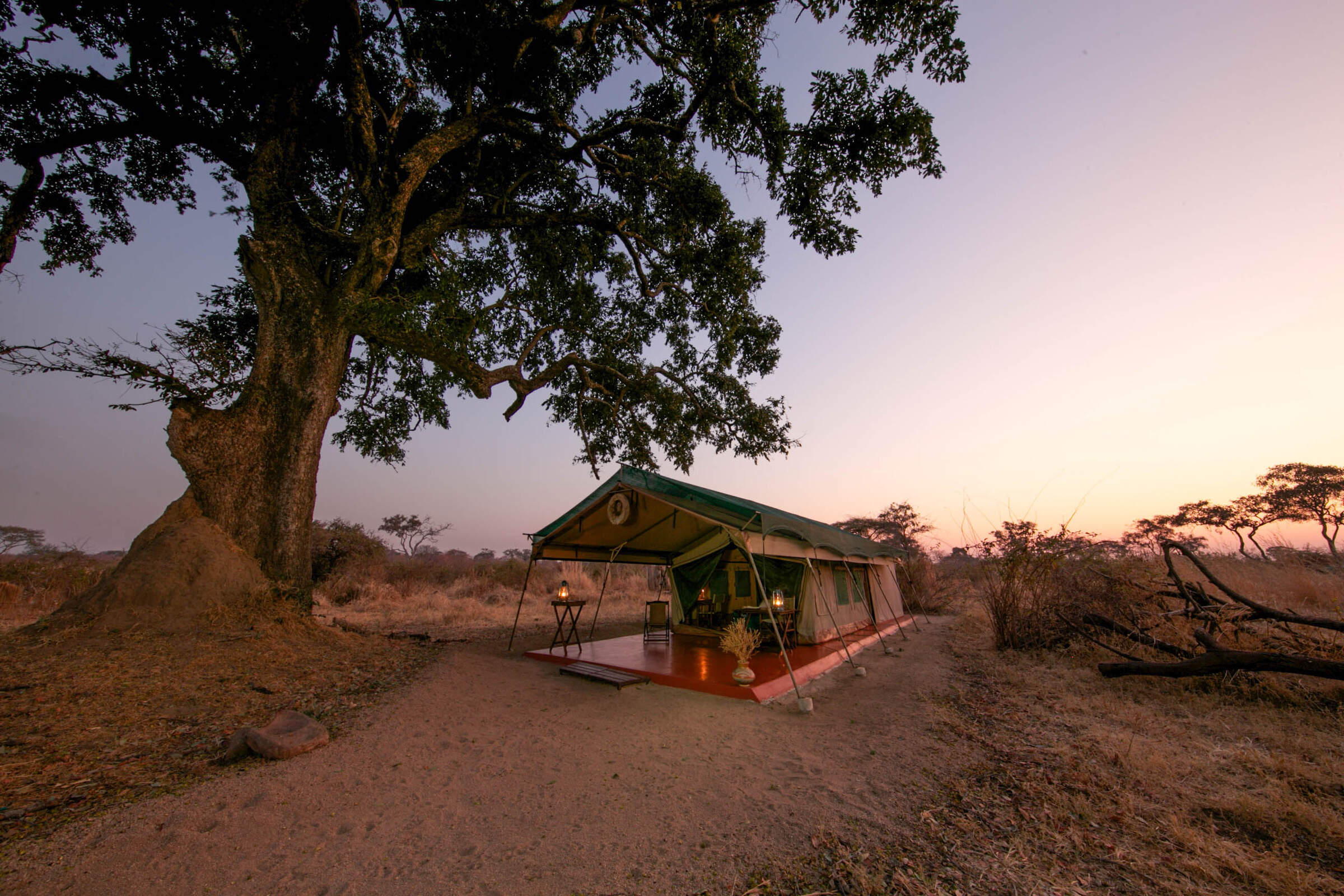
Mdonya Old River Camp
Designed with simplicity in mind, Mdonya River Camp focuses on a great wilderness experience rather than creature comforts.
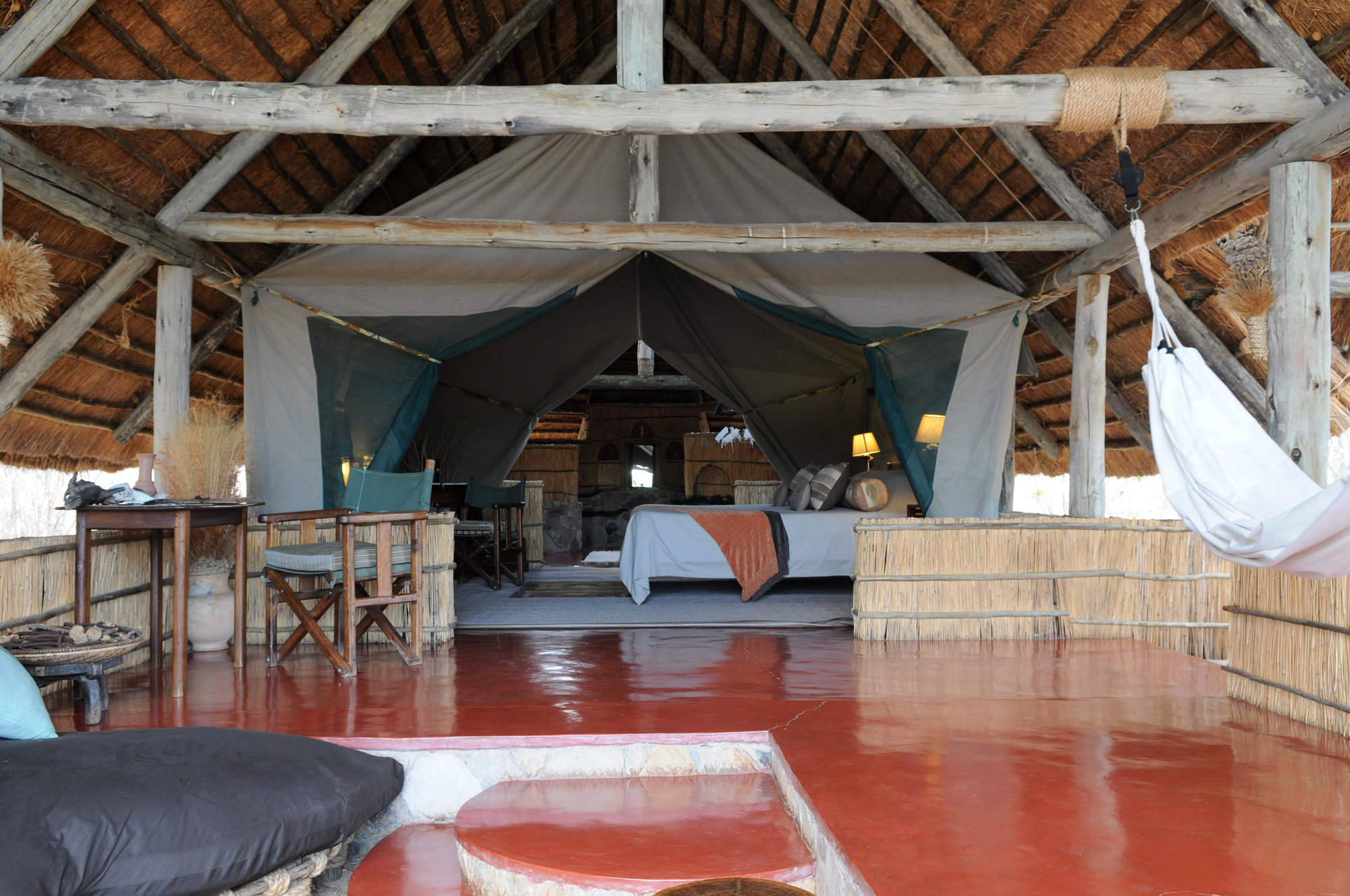
Mwagusi Safari Camp
Mwagusi is a long-established, permanent, tented safari camp, on an attractive bend of the seasonal Mwagusi River.
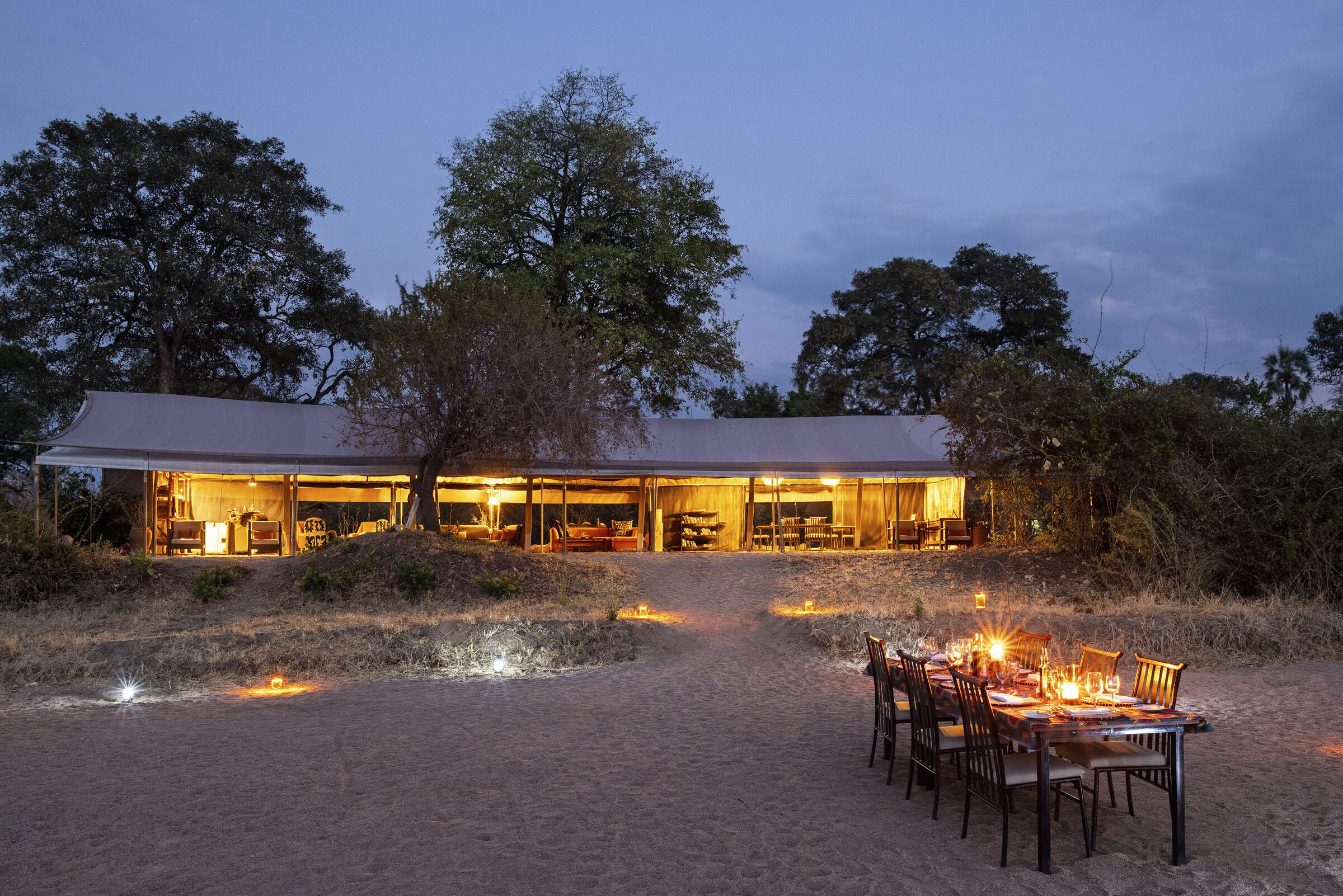
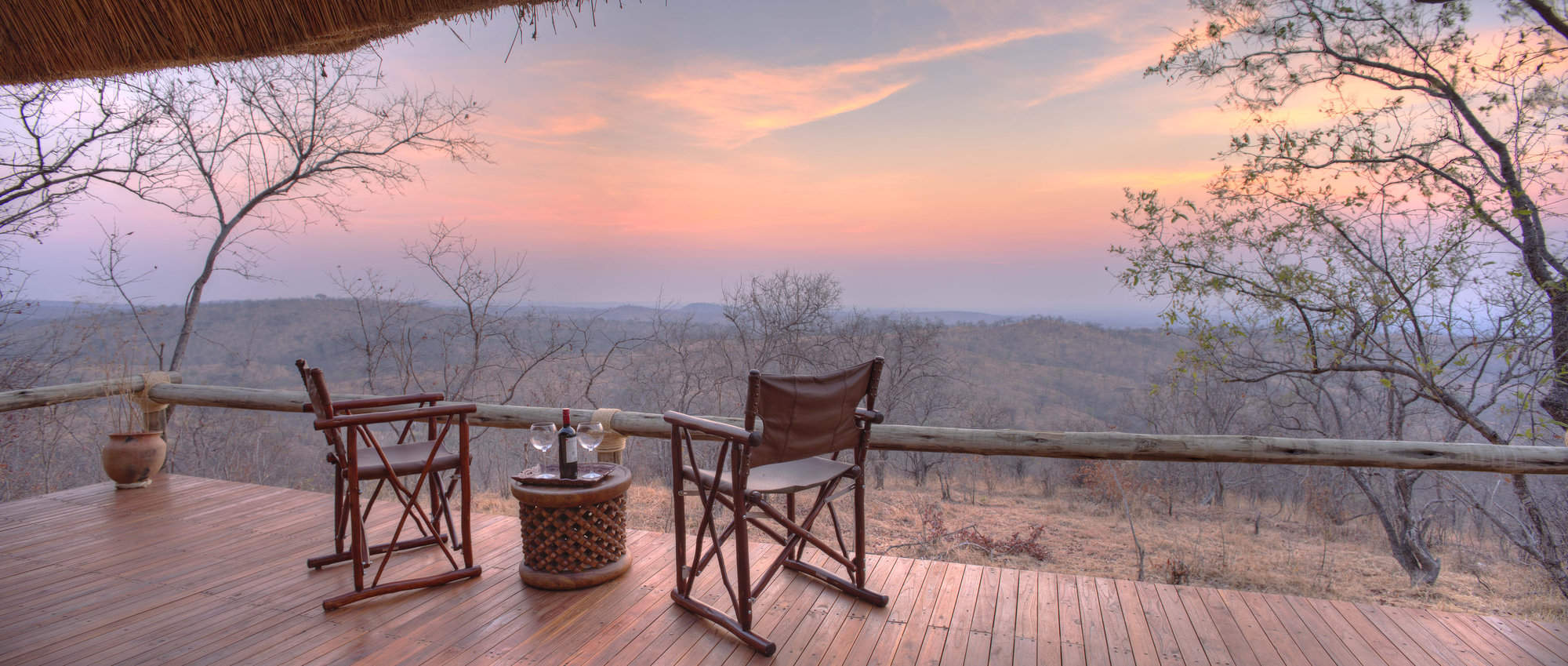
Ikuka Safari Camp
Upmarket and stylish, Ikuka Safari Camp is set high on an escarpment with spectacular panoramic views over Ruaha National Park.
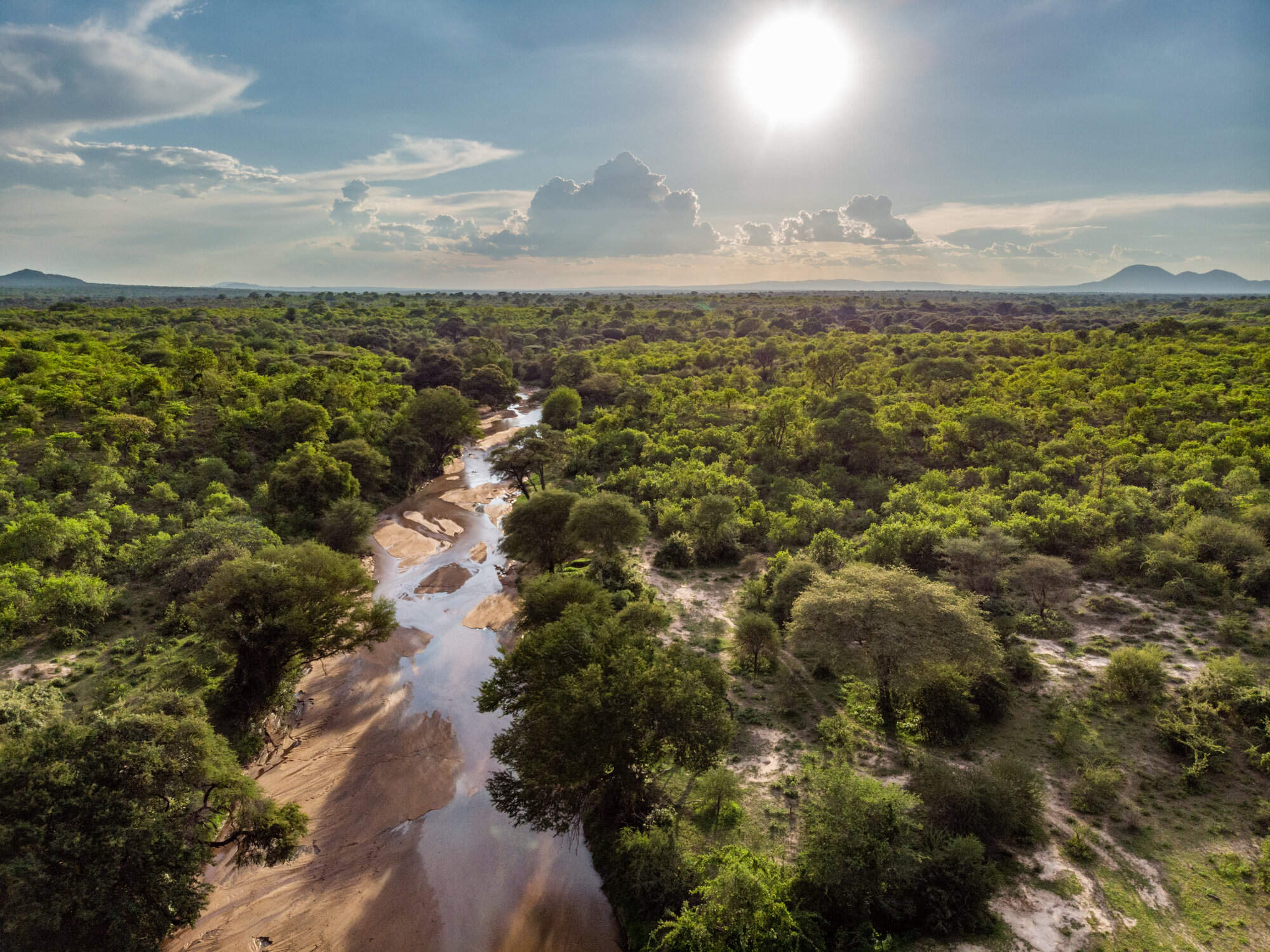
Jongomero Camp
A stylish and luxurious camp in a remote part of Ruaha, Jongomero offers excellent guiding and service in a remote, wilderness area.
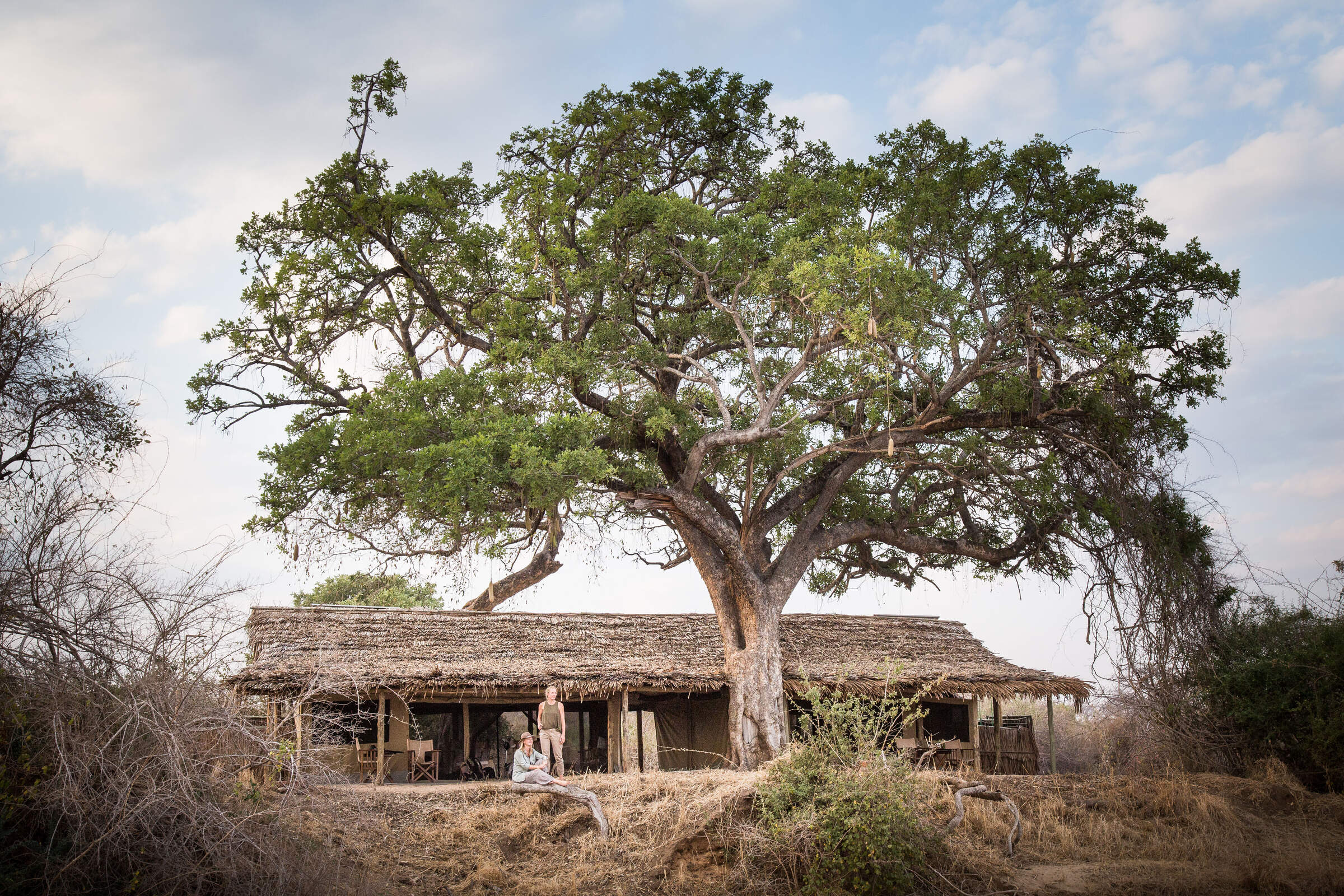
Kigelia Camp
Kigelia is a stylish tented camp, set amid a grove of sausage trees, and combining a simple set-up with comforts and luxury.
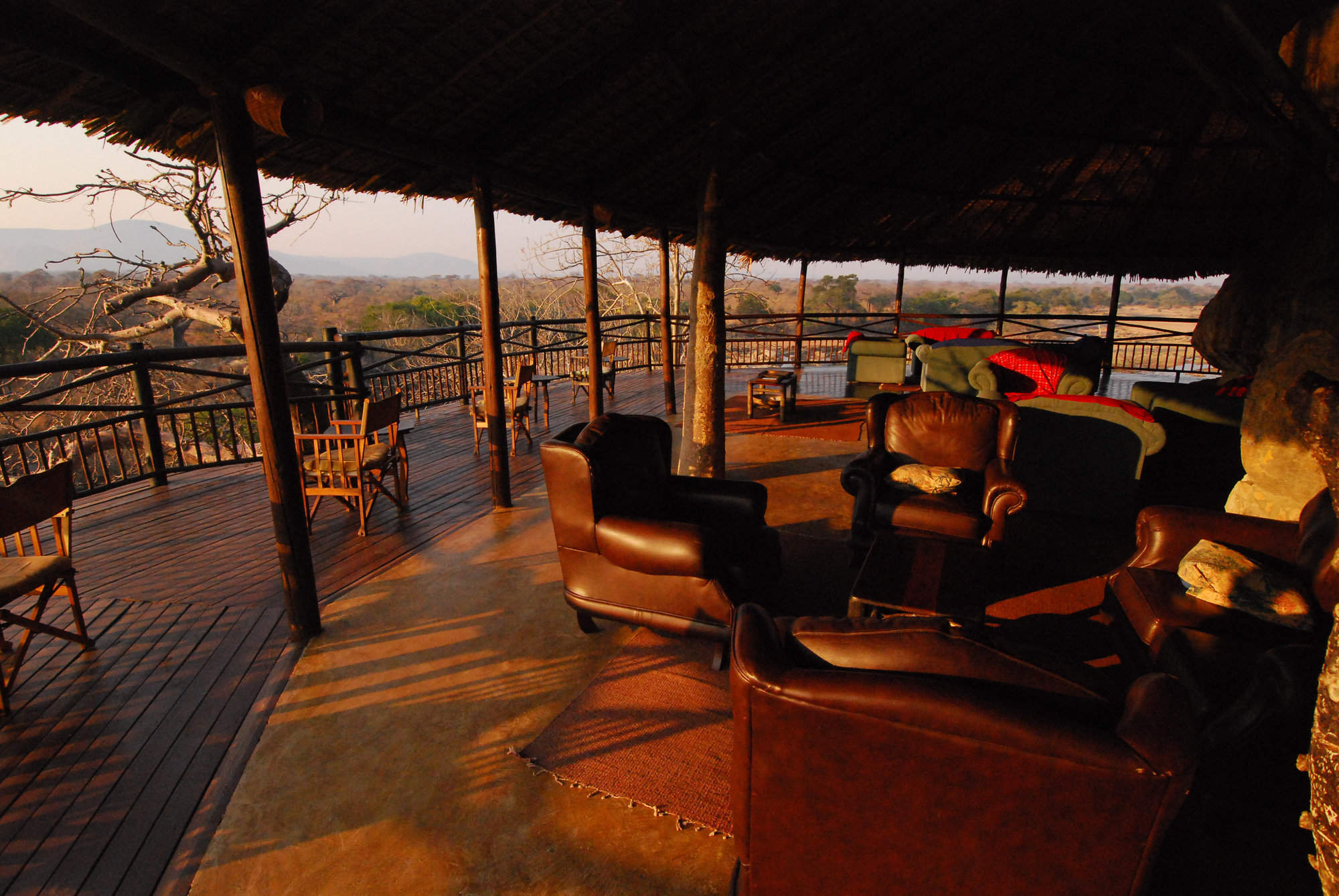
Ruaha River Lodge
In a lovely location beside a rocky river, the unpretentious Ruaha River Lodge is the largest and most economical camp in Ruaha National Park.
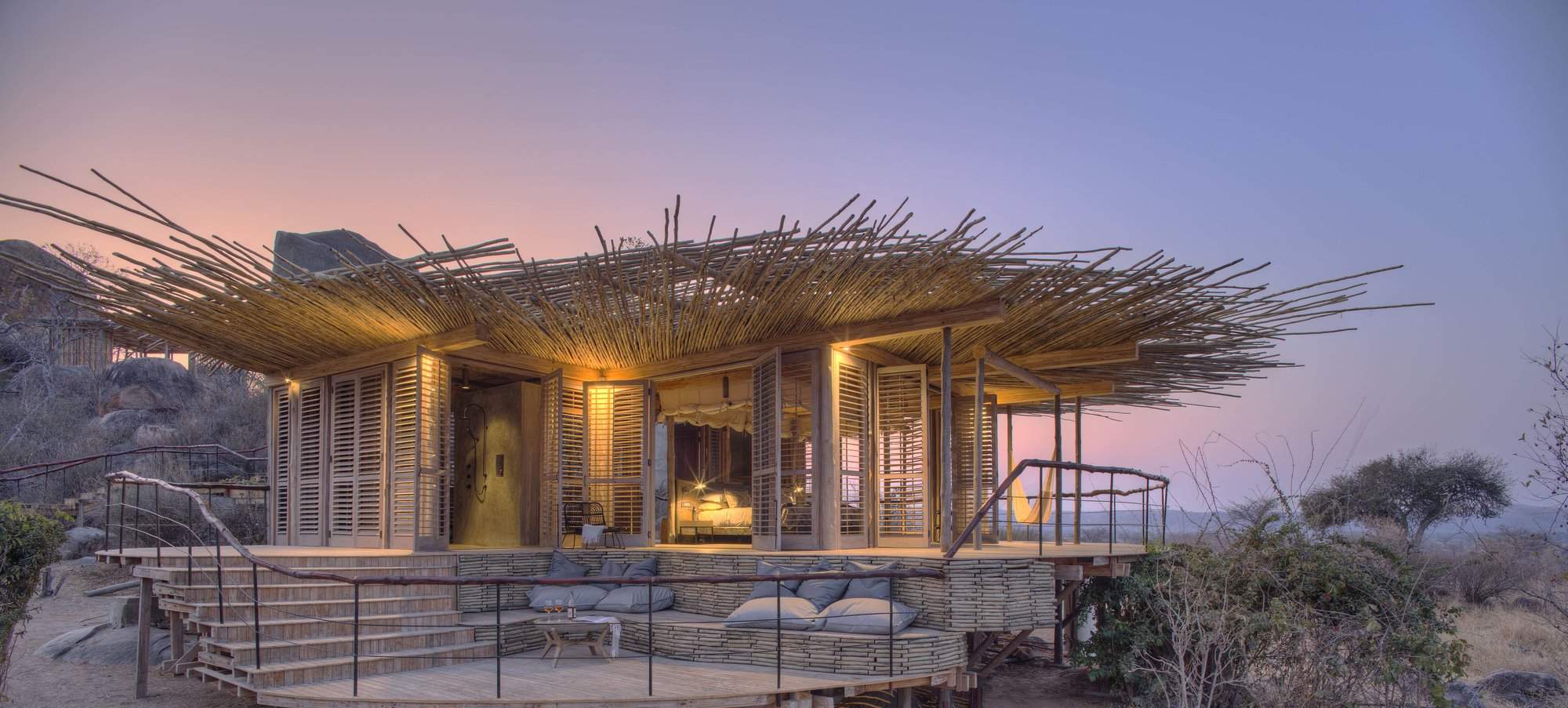
Jabali Ridge
One of Ruaha's most luxurious camps, Jabali Ridge nestles among kopjes and baobabs, with beautiful views of the surrounding area.
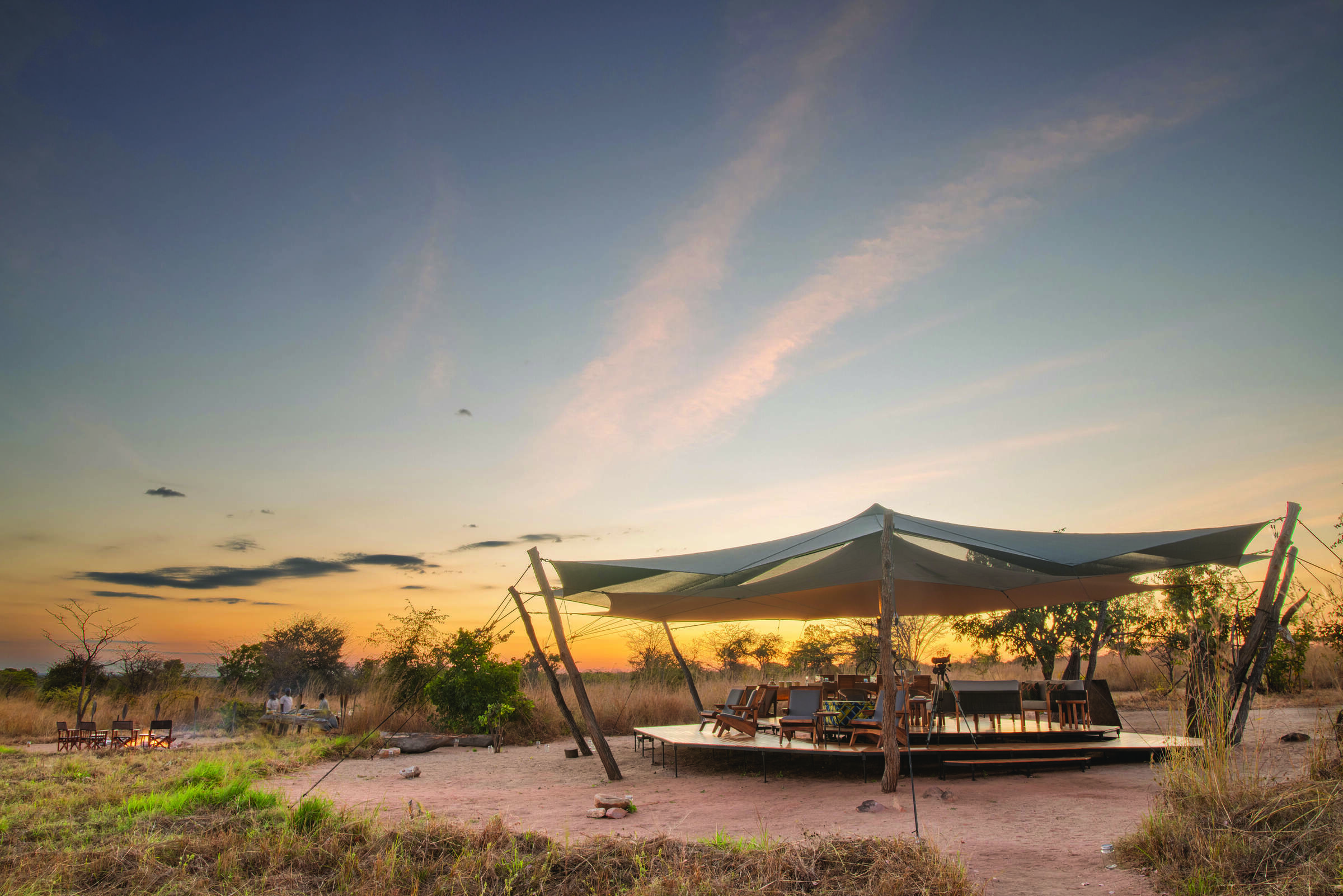
Usangu Expedition Camp
Usangu Expedition Camp is a seasonal camp in the Usangu Wetlands – a remote and enchanting part of Ruaha National Park.
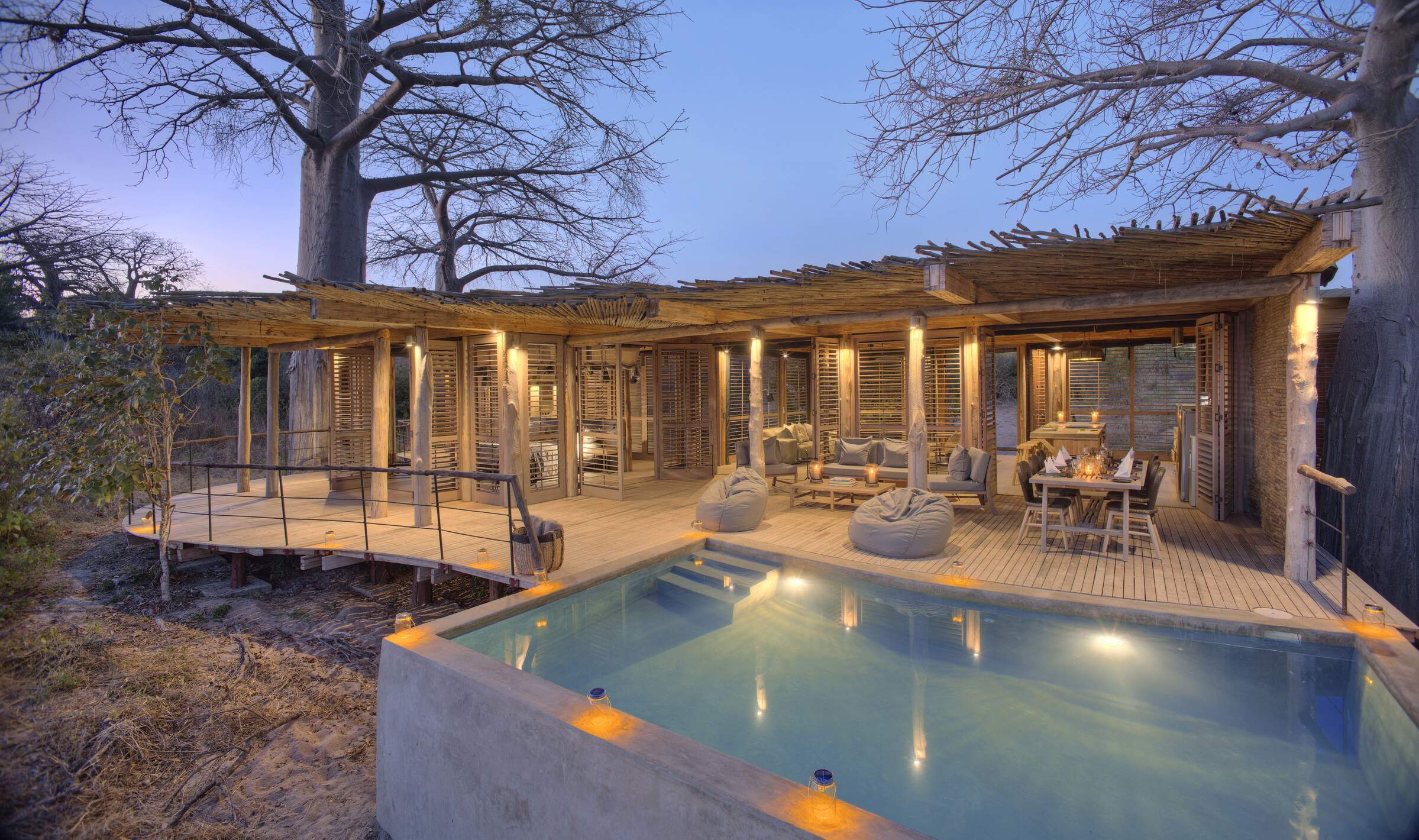
Jabali Private House
Jabali Private House in Ruaha National Park provides luxurious accommodation for private groups booked on an exclusive basis.
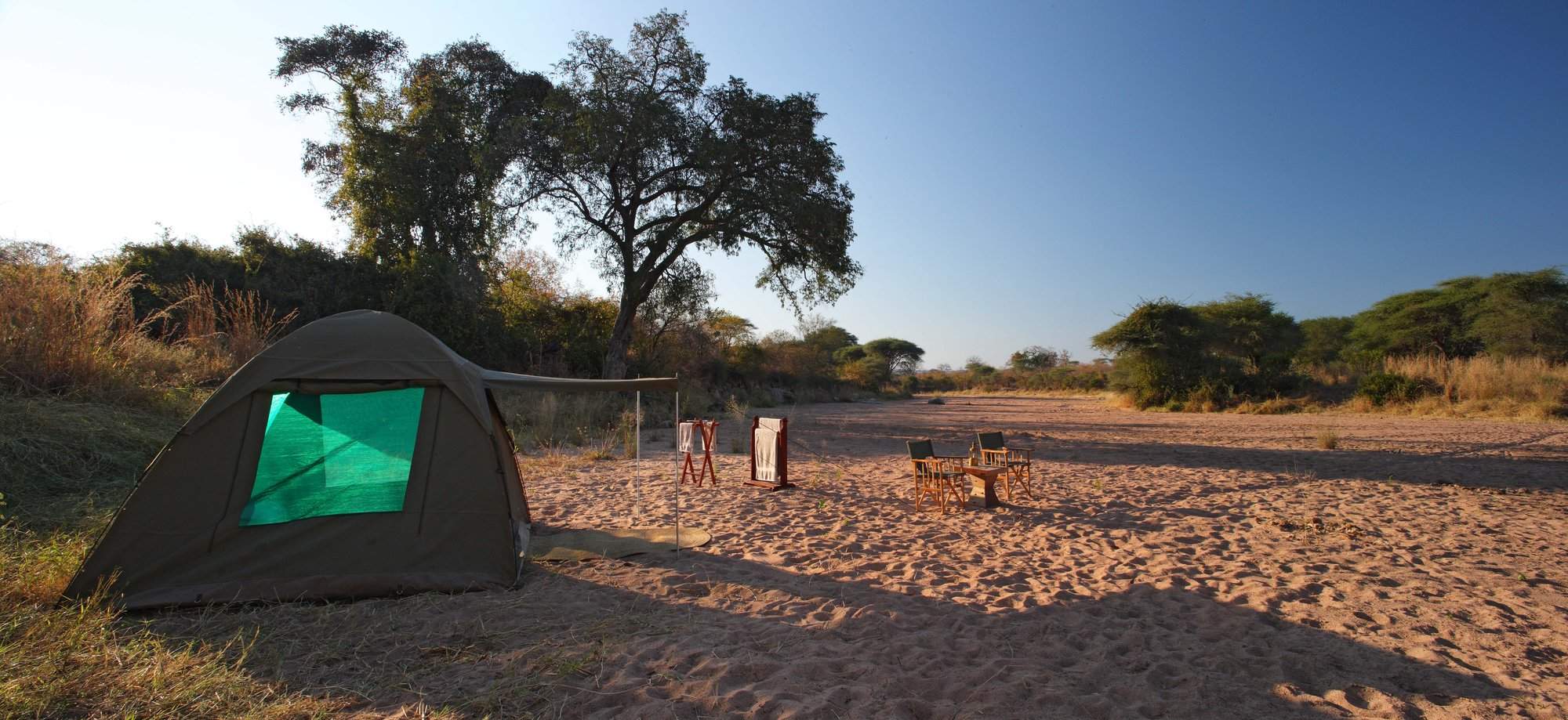
Jongomero Walking
Fly-camping and walking safaris from Jongomero Camp give you the chance to explore remote safari areas in Ruaha National Park.
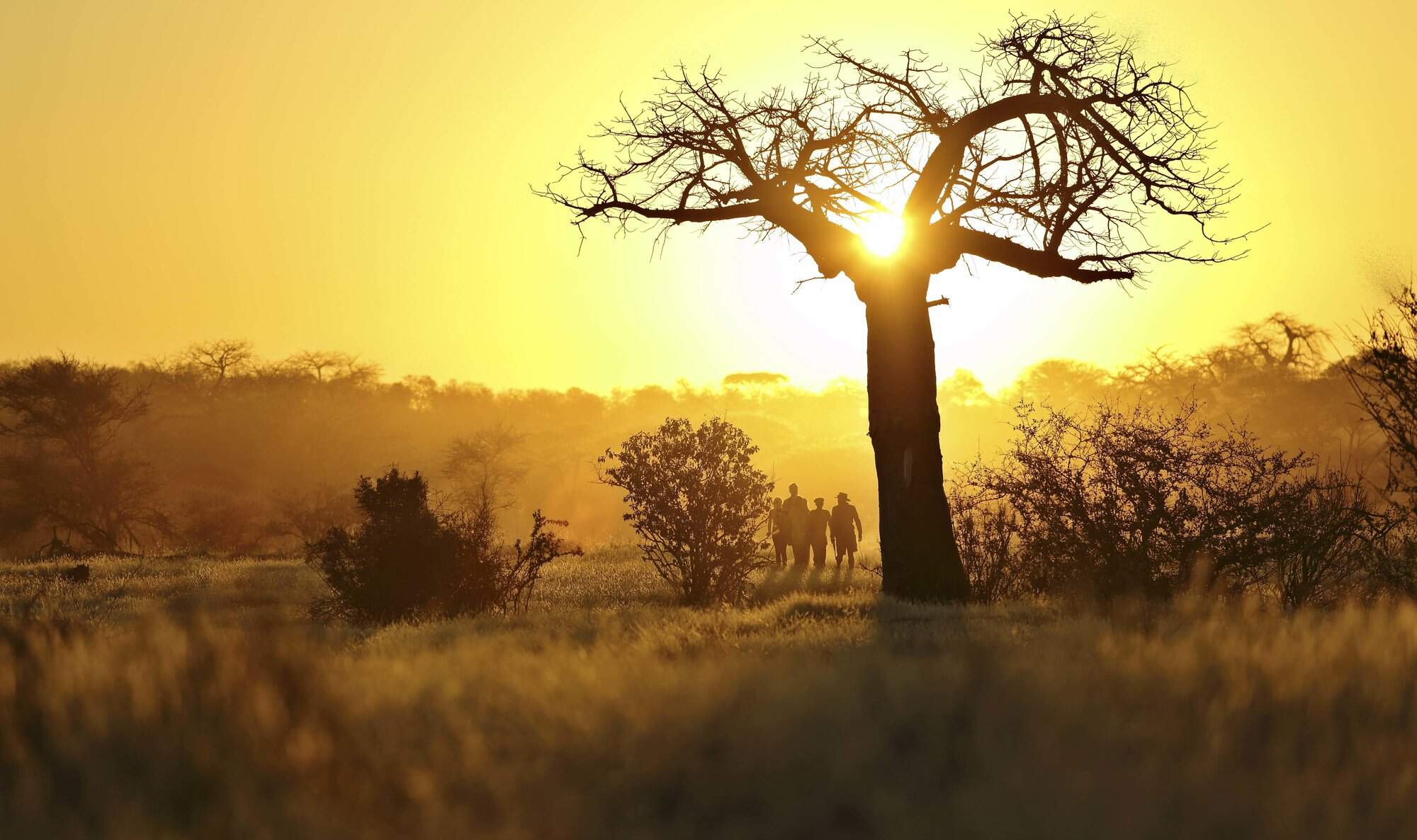
Asanja Ruaha
Asanja Ruaha Ndembo is a smart new safari lodge in a picturesque setting overlooking the Great Ruaha River.
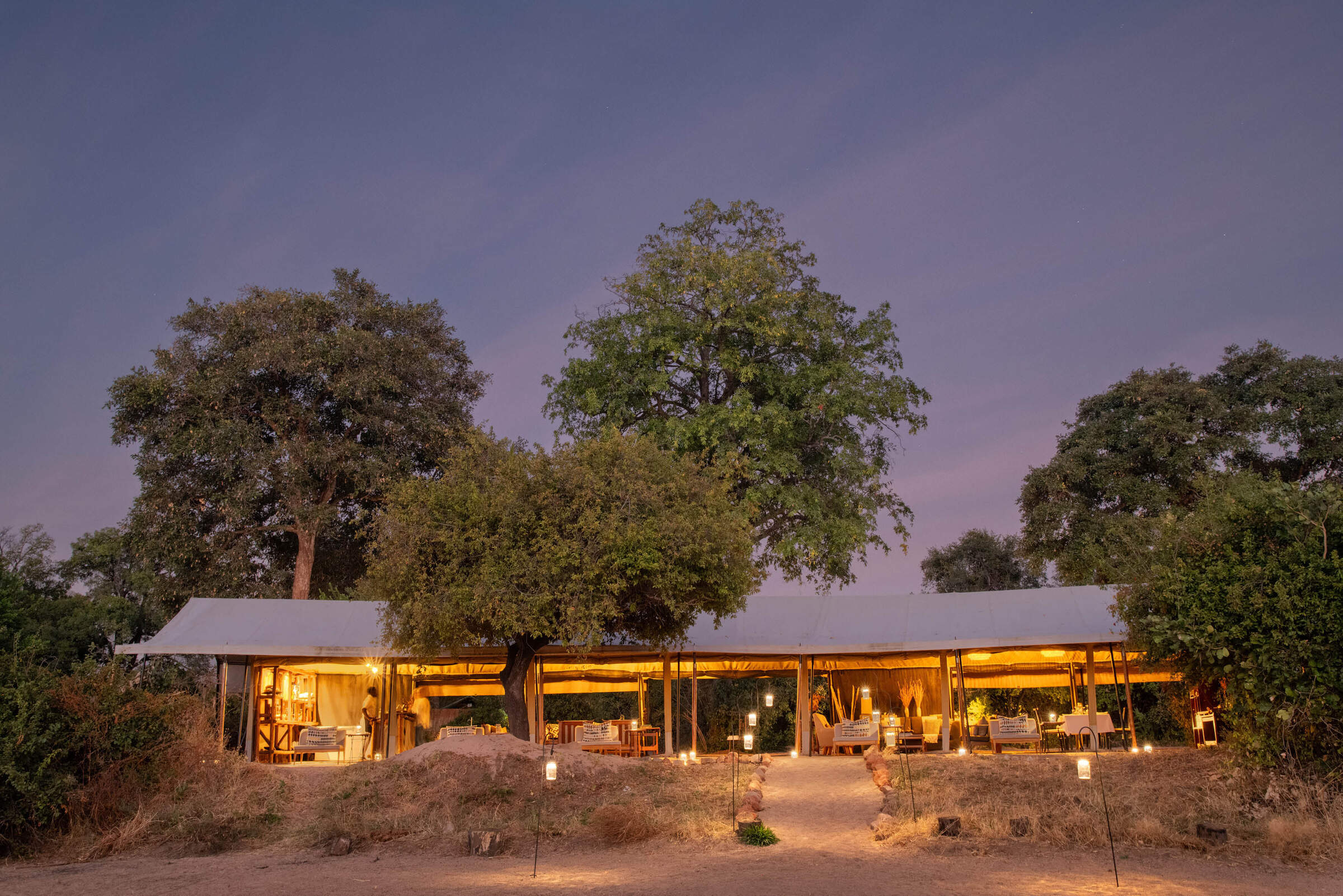
When to go to Ruaha National Park
Our month by month guide: What it's like to visit Kichaka Zumbua in Ruaha National Park
Jan
Feb
Mar
Apr
May
Jun
Jul
Aug
Sep
Oct
Nov
Dec
Ruaha National Park in January
In January, clear skies and sunshine prevail, with temperatures rising and rain showers not uncommon. This period is excellent for birdwatching, as resident birds enter breeding plumage and migrant species arrive. The Usangu wetlands teem with avian activity. After the end of the festive period, January offers great value and quiet park conditions. However, wildlife may be more dispersed in areas like Mwagusi.
The baobab-dotted landscape provides stunning backdrops for photography. Visitors can enjoy game drives along the river, spotting elephants, buffaloes, and various antelope species. Walking safaris offer intimate encounters with smaller creatures and flora.
- Variable weather: dry, cloudy, or rainy
- Occasional thunderstorms may occur
- Good time for birding, many migrant species
- Wildlife dispersed due to available water
Our view
A good time to visit, with pros & cons
Weather in January
Ruaha National Park in February
February in Ruaha is one of the hottest months, with temperatures reaching around 33°C/91°F. The short dry season continues, making it an excellent time for wildlife viewing around the Great Ruaha River and remaining water sources. There are few tourists in the park at this time, and lodge rates are lower.
This month is particularly rewarding for birdlife as northern hemisphere migrants join resident species in the Usangu wetlands and along the river banks. The Mwagusi area is prime for lion spotting, while the rolling hills and rocky escarpments offer breathtaking vistas. Visitors can enjoy bush picnics and guided walks to explore the diverse flora.
- Hot and dry weather in Ruaha
- Wildlife congregating around water sources
- Excellent game viewing opportunities
- Lush and green landscapes after rains
- Fewer tourists, more intimate safari experience
Our view
A very good time to visit
Weather in February
Ruaha National Park in March
The Great Ruaha River swells, attracting diverse wildlife. This is an excellent time to visit as the vegetation becomes lush and vibrant. Cat sightings may be infrequent, but birdwatching remains exceptional, especially around the Usangu wetlands.
Many camps begin to wind down operations, but those remaining open offer great value. The rains transform the landscape, with baobabs and acacias in full bloom. Walking safaris may be limited, but game drives can reveal unique sightings of animals in their rain-season behaviours.
- Hot with building humidity before rains
- Wildlife viewing variable
- Park is quiet with lower visitor numbers
- Good time for birding in Ruaha
- Green landscapes offer scenic photography
Our view
A good time to visit, with pros & cons
Weather in March
Ruaha National Park in April
April is the wettest month in Ruaha, with an average of 250mm of rain. The park's ecosystem thrives, with the Great Ruaha River and surrounding areas lush and teeming with life. This period is excellent for observing smaller creatures, insects, and birds.
Many of the lodges in the park will close, but a handful remain open, offering significant discounts. Visitor numbers are very low, but this is an ideal time for photographers capturing the park's verdant beauty and for those interested in the park's diverse flora. While big game viewing becomes more challenging due to dense vegetation, patient observers can be rewarded with unique sightings.
- Heavy rains expected, dramatic thunderstorms
- Some camps may close due to accessibility
- Lush vegetation, wildlife more dispersed
- Lowest visitor numbers and rates all year
- Challenging time for game viewing
Our view
This is not a great time to visit
Weather in April
Ruaha National Park in May
As May progresses in Ruaha, temperatures start to drop slightly, and the rains begin to clear. The Great Ruaha River and other water sources remain full, supporting a wide range of wildlife. This transitional period offers a unique blend of lush landscapes and improving game viewing conditions. Herbivores begin to congregate as the land starts to dry.
Visitor numbers and lodge rates remain low, providing excellent value. This is an excellent time to explore the park's diverse habitats, from riverine areas to the baobab-studded savannas.
- Rains continue, creating dramatic skies
- Quiet period with few other tourists
- Lush green landscapes throughout the park
- Wildlife dispersed, fewer sightings
- Lower prices make safaris more affordable
Our view
This is not a great time to visit
Weather in May
Ruaha National Park in June
June marks the end of the rainy season in Ruaha, with wildlife starting to concentrate around perennial water sources like the Great Ruaha River. The landscape begins to dry, but many areas remain green. This is the start of the shoulder season, with camps reopening and offering good value.
Game viewing improves as the month progresses, particularly around the river and remaining water holes. The Mwagusi area becomes excellent for predator sightings. Walking safaris and fly-camping options increase as the terrain dries. The Usangu wetlands continue to offer excellent birdwatching opportunities. Visitors can enjoy spectacular sunsets over the baobab-dotted landscape.
- Variable weather: dry, cloudy, or some rain
- Wildlife starting to gather near water sources
- Park becoming less green, easier viewing
- Good value with shoulder season prices
- Moderate visitor numbers
Our view
A good time to visit, with pros & cons
Weather in June
Ruaha National Park in July
July in Ruaha National Park marks the beginning of the peak season. With no rainfall expected and pleasant daytime temperatures, it's an ideal time for safaris. The Great Ruaha River becomes a lifeline for wildlife, offering excellent game viewing opportunities. As the park dries, animals congregate in fewer areas, making sightings more frequent and spectacular. The Mwagusi area is particularly good for lion sightings. There is also increased chances of seeing cheetah and wild dog.
Walking safaris are at their best, allowing close encounters with the park's flora and smaller fauna. The rolling hills and rocky escarpments provide stunning backdrops for photography. Birdwatching remains excellent, especially around the remaining water sources. Night drives offer chances to see nocturnal species. Seasonal balloon safaris become available.
- Dry and warm days, cool mornings/evenings
- Excellent wildlife viewing as water diminishes
- Popular time with higher visitor numbers
- Peak season prices due to prime conditions
- Seasonal balloon safaris commence
Our view
Fantastic: the very best time to visit
Weather in July
Ruaha National Park in August
August is the heart of the dry season in Ruaha, characterised by clear skies and sunny weather. Nighttime temperatures can be cool, so layered clothing is recommended for early morning game drives. The Great Ruaha River and other permanent water sources attract large concentrations of wildlife, offering excellent viewing opportunities. The Mwagusi and Usangu areas are particularly rewarding for game viewing, and this is traditionally a good time of year for cat sightings.
The iconic baobab trees stand out starkly against the dry landscape. Walking safaris and bush picnics are at their best.
- Dry weather, cool mornings and evenings
- Superb wildlife viewing around water sources
- Busy season with many visitors in Ruaha
- Book early as camps fill up quickly
- Great time for predator sightings
Our view
Fantastic: the very best time to visit
Weather in August
Ruaha National Park in September
September is an excellent month to visit Ruaha. As the dry season peaks, wildlife becomes increasingly concentrated around remaining water sources, particularly the Great Ruaha River. This leads to high densities of animals and frequent predator sightings, especially in the Mwagusi area. The landscape is starkly beautiful, with baobabs and dry savanna dominating.
This is an ideal time for walking safaris and night drives. Birdwatching remains rewarding, especially around the shrinking water bodies. The Usangu wetlands, though diminished, still attract diverse birdlife.
- Fantastic wildlife viewing opportunities
- Parks slightly less busy than peak months
- Very dry conditions, sparse vegetation
- Cool mornings, warm days in Ruaha
- High season prices still in effect
Our view
Fantastic: the very best time to visit
Weather in September
Ruaha National Park in October
October in Ruaha marks the end of the dry season, offering some of the best wildlife viewing opportunities. The Great Ruaha River and remaining water holes attract large concentrations of animals, making for spectacular game drives. Elephant sightings are particularly frequent during this time.
The landscape is at its driest, creating a striking backdrop for photography, though it can be dusty. Predator sightings, especially of lions and leopards, are common in areas like Mwagusi. Walking safaris provide intimate wildlife encounters. Birdwatching remains excellent as migratory species begin to arrive. There's a chance of early rains towards the end of the month, bringing relief to the parched landscape. Balloon safaris operate until the end of October.
- Mostly dry with comfortable temperatures
- Excellent game viewing, especially around rivers
- Landscape can appear barren and dusty
- Lower visitor numbers than earlier months
- Chance of dramatic storms towards month-end
Our view
A very good time to visit
Weather in October
Ruaha National Park in November
November usually sees the start of the rains in Ruaha, though the timing varies yearly. Game viewing is very dependent on the rains. The landscape begins to transform, with new growth appearing. This is an excellent time for birdwatching as migratory species arrive in the Usangu wetlands and other areas. Most camps remain open, offering shoulder season rates and good value.
Early November can be particularly rewarding, combining late dry season wildlife concentrations with the first rains. The large buffalo herds tend to move up onto the escarpment. Walking safaris may be possible depending on conditions. The baobab trees start to leaf, creating a beautiful contrast with the dry landscape.
- Variable weather: dry, cloudy, or rainy
- Park relatively quiet, lower-end prices
- Good wildlife sightings before rains disperse
- Some camps may close for maintenance
- Unpredictable conditions
Our view
A good time to visit, with pros & cons
Weather in November
Ruaha National Park in December
December is a quiet time to visit the park. Game viewing is good, with animals still relatively concentrated. The landscape is a mix of dry areas and new growth, creating diverse habitats. Birdwatching is excellent, with both resident and migratory species present in abundance, especially in the Usangu wetlands. The festive period can be busy, so early booking is essential.
Outside the holiday season, December offers great value with shoulder season rates. Temperatures are pleasant, averaging around 27°C/81°F, with occasional thunderstorms adding drama to the landscape. Walking safaris (weather permitting) and night drives provide varied wildlife experiences.
- Variable weather with possible thunderstorms
- Good game viewing in Ruaha's core areas
- Very quiet early, becoming busier later
- Prices low early, rising significantly later
- Green vegetation starting to return
Our view
A good time to visit, with pros & cons
Weather in December

Looking for inspiration on where to travel next?
Visit our trip chooser to explore your options and find inspiration for your perfect African adventure
Inspire me